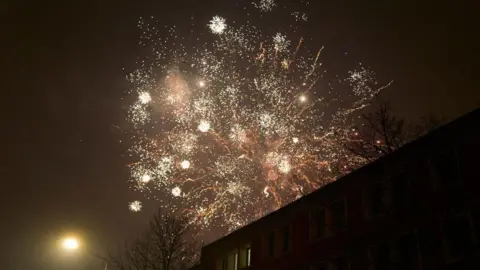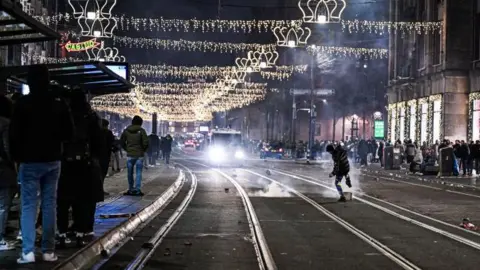Dutch vote to ban New Year's fireworks, but not just yet
 Pierre Crom/Getty Images
Pierre Crom/Getty ImagesThe Dutch parliament has voted to ban people buying and setting off fireworks, but not until after next New Year's Eve.
A majority of MPs backed a consumer ban but supported a separate motion postponing it because of potentially enormous compensation claims from fireworks suppliers.
Fireworks have been a New Year tradition for decades in the Netherlands, but the scale of injuries and damage on the night has spiralled in recent years.
Last New Year's Eve, two people were killed and 1,162 people needed emergency treatment for a range of injuries including burns and eye damage.
New-year celebrations have become a byword for antisocial behaviour in many Dutch cities and public support for a ban has gradually changed the minds of politicians too. Three-quarters of the Dutch public now support a ban, according to a recent opinion poll.
The centre-right liberal VVD party, which is part of the Dutch government, swung behind a ban at the end of March, followed by another coalition party, NSC.
However, the two other ruling parties objected, arguing most of the problems stemmed from illegal rather than legally bought fireworks.
Locally run firework displays could survive the ban, but details are yet to be agreed.
The awkward compromise of delaying the ban until New Year's Eve 2026 has led to fears of a final night of legalised mayhem.
Mirjam Bikker of the Christian Union party was concerned that next 31 December would end up as "yet another kind of Armageddon and everyone will go completely crazy and go off the rails one more time".
It is not just that fireworks are routinely set off in the street in the Netherlands, but cars, scooters and buildings have been set alight and riots have broken out with fireworks thrown at emergency services.
Last new year, 200 people were arrested and damage caused by fireworks was estimated at €16m ($17.5m; £13.7m).
 Getty Images
Getty ImagesNineteen towns and cities imposed firework bans while many other areas created firework-free zones. But the bans were largely ignored and the mayor of Amsterdam said it was hopeless as long as the government did nothing to put an end to commercial sales.
The Netherlands is not alone. Belgium and Germany have seen firework violence too.
The head of the NPB Dutch police union, Nine Kooiman, said police felt as if they were working "in a war zone". A survey of union members suggested four out of 10 officers preferred not to work on New Year's Eve because of the severe safety risks.
Although a range of Dutch groups have backed a ban, fireworks suppliers are seeking some €895m in compensation because of the stocks they have bought up for the next new year.
The government puts the cost of compensation at between €100-150m if a ban comes in this year, but more like €50m if it is introduced in 2026.
